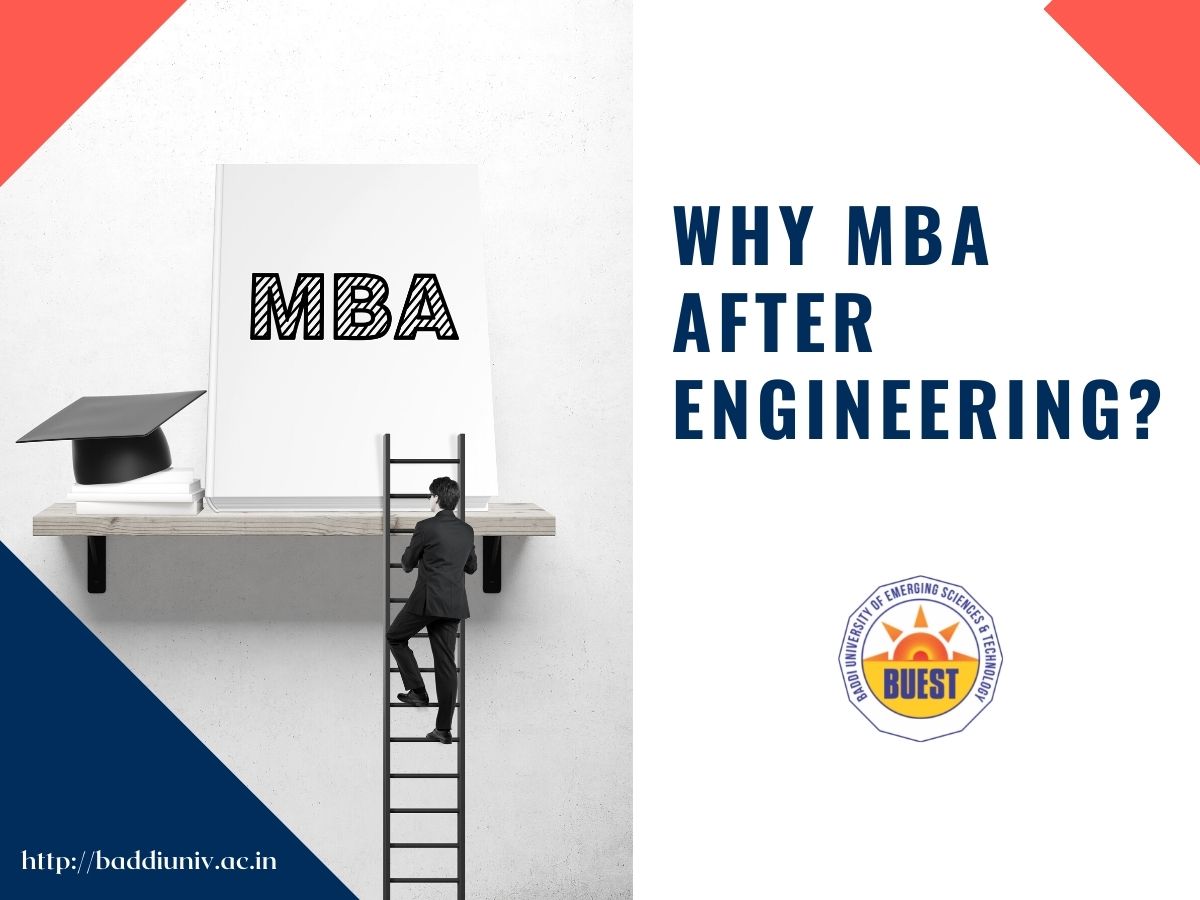
Why MBA After Engineering?
Do you intend to pursue an MBA after completing your engineering degree? If you are contemplating the pros and cons of obtaining an MBA after engineering, you should read this blog.
Why are so many engineering graduates seeking an MBA after earning their engineering degree? MBA graduates perform incredibly well in the workplace, and there are numerous advantages to pursuing an MBA after Engineering.
The MBA curriculum is designed to equip students with the correct combination of business and management abilities to become valuable professionals in their respective industries. Let’s examine the top advantages of an MBA after engineering.
Opens Door For Various Career Options
One of the main advantages of obtaining an MBA after completing an engineering degree is that it opens the door to several employment opportunities. A person with a degree in engineering will have knowledge and skill in the scientific and technical areas.
Obtaining an MBA will enhance and expand your knowledge in related sectors. The greatest advantage of an MBA after engineering is that it provides a comprehensive approach to learning, and graduates can work in any field they like.
A Widely Recognized Degree
MBA is a common and prestigious degree around the world. While studying this course, you must have sufficient proficiency in your selected disciplines.
After earning a bachelor’s degree in engineering, an MBA opens doors to expansive alumni networks, prestigious internships, and top managerial jobs. It is the beginning of one of the most promising professional chances.
After obtaining a BTech degree, MBA is a fantastic alternative to have. Several students have already decided to pursue an MBA to advance their careers.
It is a vastly varied field. In addition, it offers courses in other fields. For instance, if you are interested in Sports and Luxury, you can always pick MBA ESG.
Safe Choice
MBA after BTech is generally regarded as a secure option. There is a guarantee of placement. A basic bachelor’s degree does not provide the same benefits. Most importantly, many businesses choose MBA graduates over BTech grads.
You Gain Relevant Experience in College.
MBA students receive a substantial amount of practical training or field training with their prospective employers. In addition, corporations invest a substantial amount of time and capital in training these individuals. Most BTech courses do not provide BTech students with adequate field training or practical experience.
Numerous Industry Specialists and Insiders are Available.
It enables you to learn from various effective leaders, optimists, business people, and experts. Consequently, you can network and gain valuable experience while advancing your profession.
You Can Be Your Boss.
After obtaining a bachelor’s degree in engineering, most students pursue a master’s degree in business administration (MBA) to get executive-level administrative positions in firms, whereas others.
They pursue an MBA to become entrepreneurs and launch businesses. MBA coursework encompasses company management, planning, marketing, financial management, and various other entrepreneurial abilities. Therefore, it is an extremely desired degree to pursue after BTech.
Option to go from Technical to Management
Do you believe that a BTech degree is not for you and that you would excel in a managerial field? Have you ever seen yourself as something other than an engineer? In this instance, pursuing an MBA in Engineering is a wise decision.
Flexible Study Options
The flexibility provided by an MBA allows you to pursue a postgraduate degree while maintaining your current employment. Many institutions offer part-time and weekend MBA programs for students who need to gain work experience while studying.
In conclusion, this is how working professionals can enhance their abilities. This enhances the worth of their résumé. Also, you can simultaneously learn and study in this manner.
New Skills and Expertise
An MBA after studying engineering will enhance your resume. It will also serve as evidence that you are a management expert. Moreover, it will teach you the most effective management skills you may apply to your career.
More Job Opportunities
The variety of disciplines taught and introduced in an undergraduate course is extremely limited compared to an MBA degree.
The degrees awarded by most MBA schools in India cover a broad range of fundamental topics. It encompasses statistics, economics, human resources, finance, information technology, business, etc.
Consequently, it leads to a more level playing field and broadens your perspectives. You might expect to get great employment in various industries with proper exposure.
Skip the Lower Range
If you opt to pursue an MBA after completing a BTech degree, you are immediately placed in the middle of the elite. Most undergraduate programs force students to begin their careers at the bottom. An MBA expedites your ascent up the corporate ladder.
High Earnings
This is an extremely significant consideration. Many BTech graduates pursue an MBA to earn a higher salary. Obtaining an MBA following engineering is the best alternative if you desire a larger salary. Depending on your experience, the difference may be minimal or substantial.
The average income for MBA graduates is approximately 6,87,000 INR per year, or possibly higher. In comparison, the average annual salary for a BTech graduate is up to INR 5,70,000.
Reputable Career Choice
A graduate of an MBA program has greater positional credibility than graduates of other programs. Therefore, you would have a more secure and reputable career path than other working officials.
MBA after BTech will better demonstrate your expertise in a certain field, such as finance, business, IT, economics, management, and marketing.
MBA after Engineering, on the other hand, demonstrates that you have specialized in a certain field, which increases the value of your resume.
Additionally, it demonstrates your trustworthiness and expertise in your sector. This credibility is attained after earning an MBA.
Opportunity to Work With Elite Global Brands
The majority of multinational corporations employ managerial and technical personnel.
It’s not as if they hire individuals based only on this perspective. In contrast, the number of employed individuals with degrees in management and engineering outnumbers those with other educational backgrounds.
Therefore, obtaining an MBA after completing a BTech can prove highly advantageous.
This is because many candidates possess both degrees. The majority of those hired are recent MBA graduates. Typically, employment agencies require students for the IT or banking BFSI industries. Both of these industries prefer B.Tech and MBA graduates.
Therefore, you will have a wide range of job options if you earn an MBA and BTech from a respectable institution.
Greater Need for Specialists
As technology advances and improves every day and is the future of our planet, the demand for engineering graduates with an MBA will increase.
As the technical and managerial sectors are essential to the establishment and expansion of every business, the demand for people with these two degrees will never cease.
Technical and Team Leadership Qualities
You have the technical knowledge of how something operates; by completing an MBA after studying engineering, you will also be able to manage a company that operates it. A degree in engineering will provide you with leadership and management skills.
